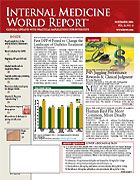Publication
Article
HIV Screening Now Part of Routine Medical Care
Author(s):
New CDC Recommendations Pave Way for Universal Testing
The Centers for Disease Control and Prevention (CDC) has issued new recommendations for healthcare providers designed to make voluntary HIV screening a standard of medical care for all patients aged 13 to 64 years (MMWR. 2006; 55:1-17). The goal is to simplify the HIV testing process and to enhance early diagnosis among the estimated more than 250,000 HIV-positive Americans who are unaware of their infection.
The recommendations also cover new procedures to improve diagnosis among pregnant women and further reduce mother-to-child transmission.
Early diagnosis can prevent progression to AIDS. Currently, nearly 40% of patients are diagnosed within 1 year of their infection progressing to AIDS, when it may be too late to enjoy the full benefits of effective treatment. Another advantage of early diagnosis is that studies have shown that most people who learn they are infected take measures to protect their partners.
Those who are unaware of their infection status account for an estimated 50% to 70% of new HIV infections. “We urgently need new approaches to reach the quarter-million Americans with HIV who do not realize they are infected,” said Julie L. Gerberding, MD, MPH, director of the CDC. “People with HIV have a right to know that they are infected so they can seek treatment and take steps to protect themselves and their partners.”
The CDC hopes to overcome several of the barriers that have limited the implementation of their earlier recommendations, which called for HIV testing in patients who were in healthcare settings with a high HIV prevalence (>1%) and in all high-risk individuals. However, many healthcare facilities do not have access to information on HIV prevalence, and many healthcare providers say they do not have sufficient time to conduct risk assessments. Physicians have also reported that the processes involved in obtaining separate, written consent and pretest counseling for HIV testing are daunting.
“Our goal is to ensure that everyone who receives medical care also has the opportunity to learn if they are infected with HIV,” said Kevin Fenton, MD, PhD, director of the CDC’s National Center for HIV, STD, and TB Prevention. “These new recommendations will make routine HIV screening feasible in busy medical settings where it previously was impractical. Making the HIV test a normal part of care for all Americans is also an important step toward removing the stigma still associated with testing.”
Major components of the new recommendations include:
• HIV screening for all patients, regardless of risk—Previous recommendations called for routine screening only of high-risk individuals and patients in settings with a high HIV prevalence. The CDC now advises screening all patients aged 13 to 64 years.
• Voluntary “opt-out” approach—The recommendations strongly emphasize that HIV testing be voluntary and performed only with the patient’s knowledge. Patients should be specifically told that HIV testing is part of routine care, and they should be given the opportunity to decline testing.
• Simplified testing procedures—Pretest counseling and separate, written consent for HIV testing is no longer required. Consent for HIV testing can be incorporated into general consent for medical care. The recommendations underscore the need to ensure that patients who test positive for HIV are given prevention counseling and linked to ongoing care. Prevention counseling is now being encouraged for all patients, especially when the clinic/office visit is related to substance abuse, sexual health, family planning, or comprehensive health assessments.
• Repeat screening in pregnancy—Repeat HIV testing should be provided in the third trimester, not only in high-risk women as previously recommended, but also in women who live in areas in which the HIV prevalence among women of childbearing age is high or who are seen in facilities where there is at least 1 HIV diagnosis per 1000 pregnant women screened. A rapid HIV test should be used during labor for all women whose HIV status is unknown.






